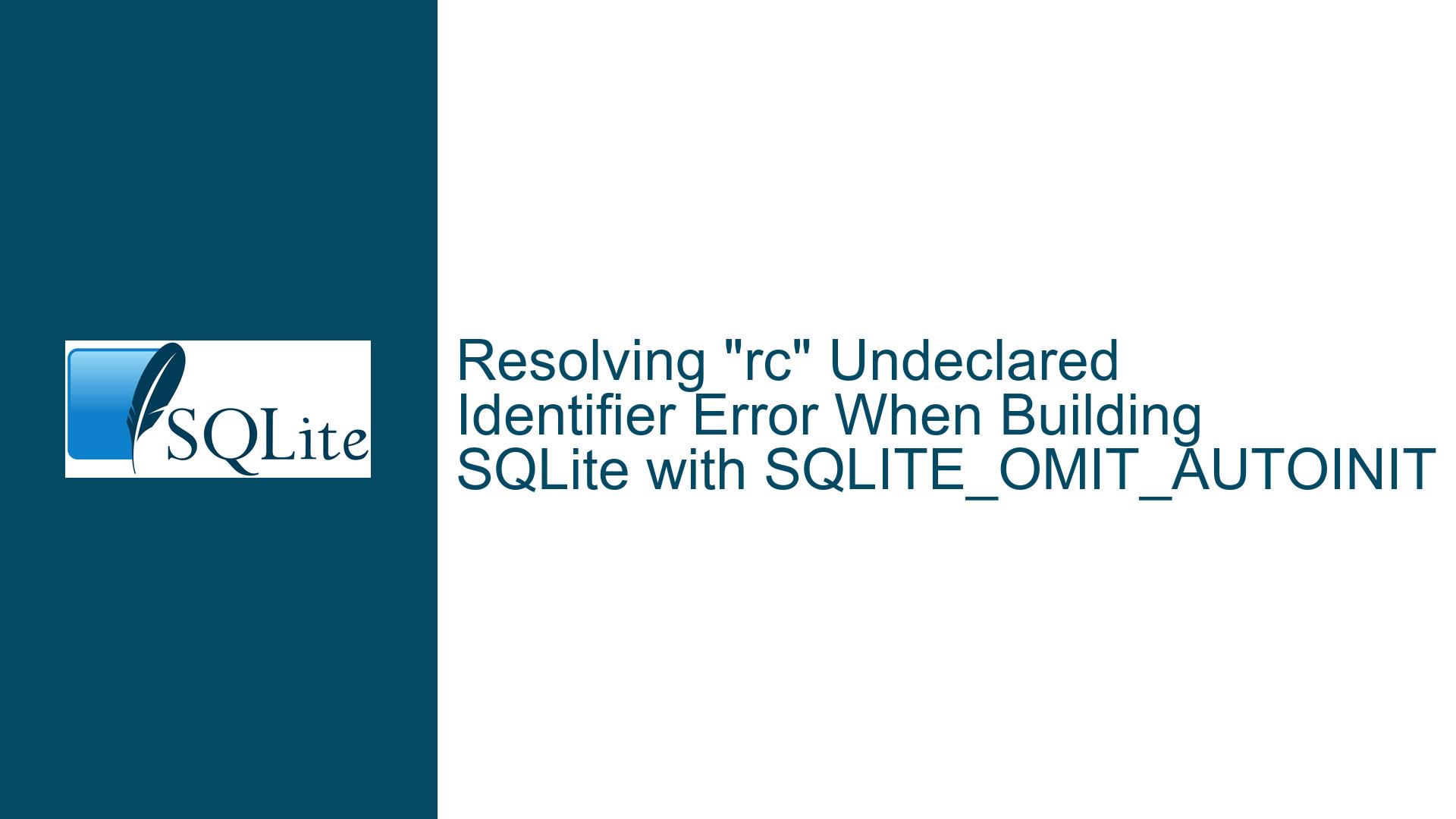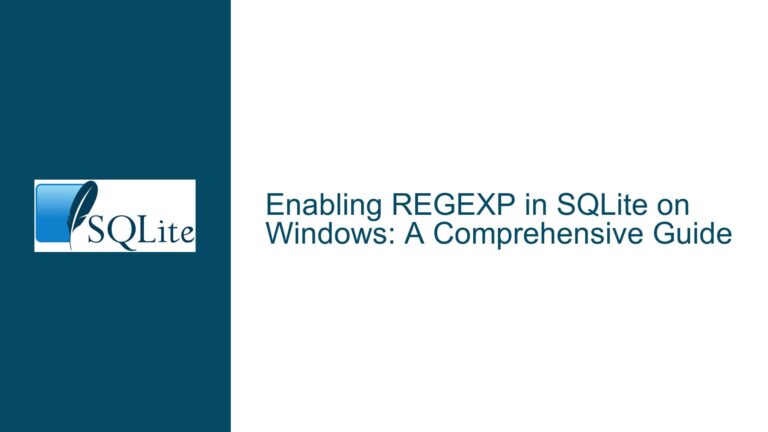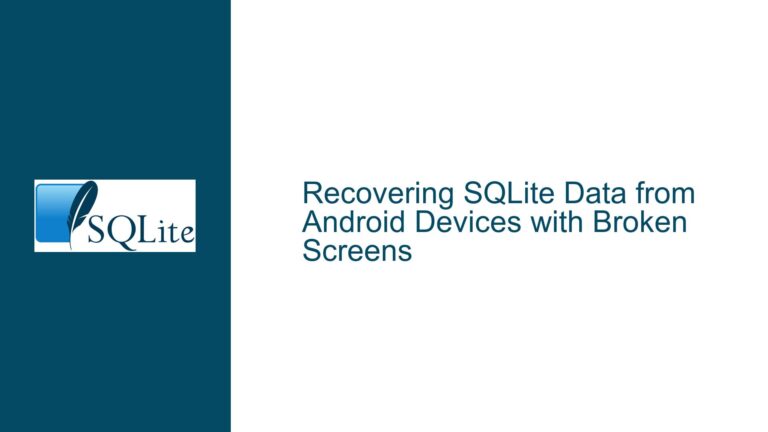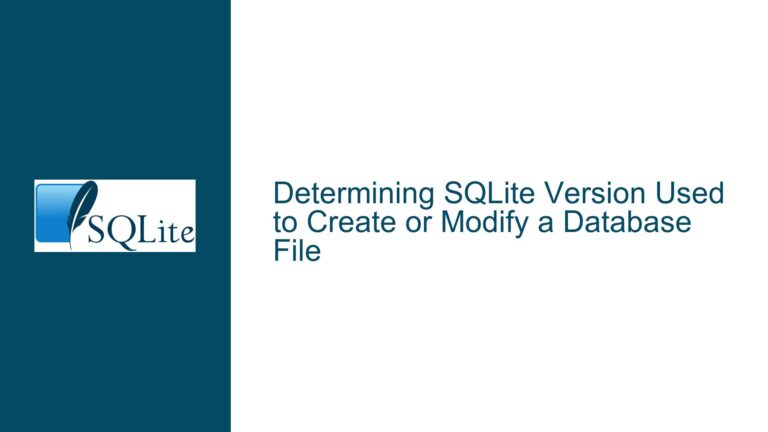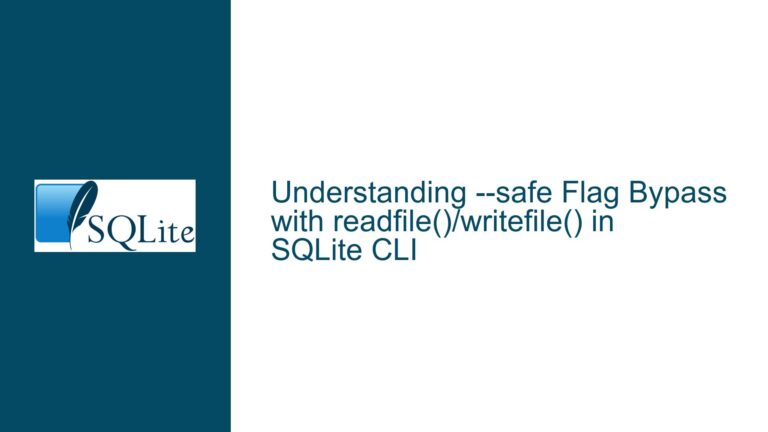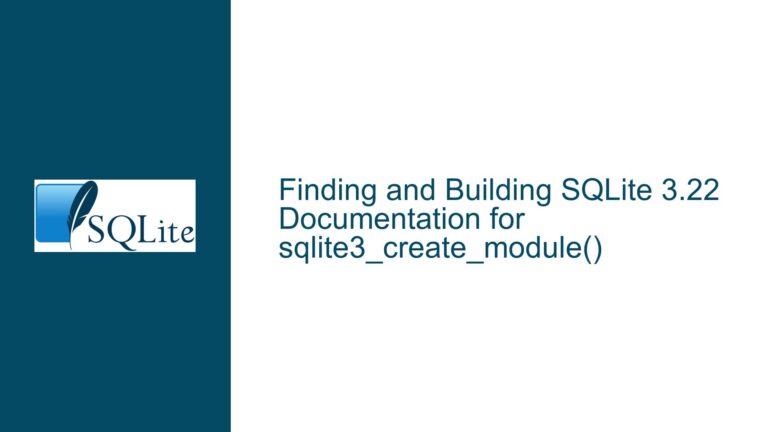Resolving “rc” Undeclared Identifier Error When Building SQLite with SQLITE_OMIT_AUTOINIT
Compilation Error Due to Missing "rc" Declaration in SQLITE_OMIT_AUTOINIT Contexts
Error Context and Code Structure
The error sqlite3.c(45519,12): error C2065: 'rc': undeclared identifier occurs during compilation of SQLite (version 3.39.3 or earlier) when the SQLITE_OMIT_AUTOINIT compile-time option is explicitly defined. This error is triggered in the os_win.c module, specifically in the sqlite3_win32_set_directory function. The root cause lies in conditional compilation logic that omits the declaration of the rc variable when SQLITE_OMIT_AUTOINIT is active.
The sqlite3_win32_set_directory function handles directory configuration for Windows-specific implementations. A preprocessor directive (#ifndef SQLITE_OMIT_AUTOINIT) guards a block that initializes the SQLite library via sqlite3_initialize(), assigns its return code to rc, and checks for errors. When SQLITE_OMIT_AUTOINIT is defined, this block is excluded. However, the subsequent code unconditionally references rc in the mutex acquisition logic, leading to a compilation failure because rc is not declared in this code path.
The code structure prior to the fix is as follows:
#ifndef SQLITE_OMIT_AUTOINIT
int rc = sqlite3_initialize();
if( rc ) return rc;
#endif
sqlite3_mutex_enter(sqlite3MutexAlloc(SQLITE_MUTEX_STATIC_TEMPDIR));
When SQLITE_OMIT_AUTOINIT is defined, the declaration of rc and its initialization are skipped, but the return rc statement is still present in the function, causing the compiler to flag rc as undeclared.
Role of SQLITE_OMIT_AUTOINIT and Its Implications
The SQLITE_OMIT_AUTOINIT macro is a non-standard, unsupported compile-time option that disables the automatic initialization of the SQLite library. Normally, SQLite APIs that depend on library state (e.g., memory allocation, mutex subsystems) call sqlite3_initialize() internally to ensure the library is properly initialized. Defining SQLITE_OMIT_AUTOINIT shifts responsibility for initialization to the application, requiring explicit calls to sqlite3_initialize() and sqlite3_shutdown().
However, using SQLITE_OMIT_AUTOINIT is discouraged by the SQLite team because it bypasses critical initialization steps that are tightly coupled with other subsystems. The error in os_win.c is a direct consequence of this coupling: the Windows directory configuration logic assumes that rc is declared in all code paths, but the omission of sqlite3_initialize() when SQLITE_OMIT_AUTOINIT is defined breaks this assumption.
Impact on Python 3.11 Builds
Python 3.11’s sqlite3 module integrates an amalgamated SQLite source code. When the Python build process defines SQLITE_OMIT_AUTOINIT (often to reduce footprint or for embedded use cases), it inadvertently triggers this undeclared variable error. The error halts compilation, preventing the successful build of Python with the updated SQLite version.
Root Cause Analysis and Edge Cases
Missing Variable Declaration in Conditional Compilation
The primary cause of the error is the absence of an rc variable declaration in the code path where SQLITE_OMIT_AUTOINIT is defined. The original code assumes that rc is declared in all scenarios but fails to account for the case where SQLITE_OMIT_AUTOINIT skips the initialization block. This creates a scoping issue where rc is referenced outside the #ifndef block without being declared.
Compiler Behavior and Code Flow
The C compiler processes preprocessor directives before parsing the code. When SQLITE_OMIT_AUTOINIT is defined, the #ifndef block is excluded, leaving no declaration of rc. The subsequent use of rc in the return statement is therefore invalid. Compilers like MSVC (which produces the cited error) enforce strict variable scoping rules, flagging this as a fatal error.
Edge Case: Partial Initialization Assumptions
A subtler edge case arises from the interaction between SQLITE_OMIT_AUTOINIT and platform-specific code. The Windows directory handling code assumes that the library is either initialized (via sqlite3_initialize()) or that the rc variable is available for error handling. When SQLITE_OMIT_AUTOINIT is defined, neither condition is met, violating the function’s internal invariants.
Unsupported Use of SQLITE_OMIT_AUTOINIT
The SQLite team explicitly states that SQLITE_OMIT_* macros are unsupported unless documented otherwise. Relying on these macros introduces fragility, as seen here. The error is a direct result of using an unsupported configuration, which the SQLite codebase does not rigorously validate.
Resolution Strategies and Code Corrections
Applying the Official SQLite Patch
The SQLite trunk commit f74a5ea8c986dc33 resolves the issue by ensuring rc is declared in all code paths. The patch modifies the conditional compilation block to include an #else clause that declares rc with a default value:
#ifndef SQLITE_OMIT_AUTOINIT
int rc = sqlite3_initialize();
if( rc ) return rc;
#else
int rc = SQLITE_OK;
#endif
This guarantees that rc is declared whether or not SQLITE_OMIT_AUTOINIT is defined.
Steps to Apply the Fix:
- Manual Patching: Edit the
os_win.cfile in the SQLite amalgamation. Locate thesqlite3_win32_set_directoryfunction and modify the#ifndef SQLITE_OMIT_AUTOINITblock to include the#elseclause. - Use Updated Amalgamation: Replace the
sqlite3.cfile with a version that includes the trunk commit.
Rebuilding Python with the Patched SQLite
After patching SQLite, rebuild Python 3.11:
- Replace the
Modules/_sqlite/sqlite3.cfile in the Python source tree with the patched version. - Run the Python build process, ensuring no additional
SQLITE_OMIT_*flags are set unless absolutely necessary.
Avoiding SQLITE_OMIT_AUTOINIT
The simplest workaround is to avoid defining SQLITE_OMIT_AUTOINIT unless explicitly required. Most applications do not need this flag, as the automatic initialization overhead is minimal. If footprint reduction is critical, consider alternative optimizations (e.g., omitting unused features via supported SQLITE_OMIT_* macros).
Conditional Compilation Guardrails
For codebases that must use SQLITE_OMIT_AUTOINIT, implement defensive coding practices:
- Audit All API Calls: Ensure that
sqlite3_initialize()is called manually before invoking SQLite functions. - Compiler Warnings: Enable compiler warnings (e.g.,
-Wdeclaration-after-statementin GCC) to catch similar issues early.
Long-Term Maintenance Considerations
- Track SQLite Updates: Monitor SQLite’s changelog for fixes related to
SQLITE_OMIT_*configurations. - Contribute to Upstream: Report edge cases encountered when using unsupported options, as maintainers may accept patches that improve robustness.
By addressing the declaration oversight and adhering to supported configurations, developers can resolve the compilation error and ensure stable integration of SQLite into their projects.
